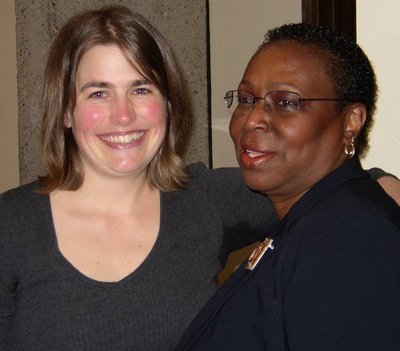April 13, 2006
UW Women Studies Department grants first doctoral degree
Just before winter quarter ended, Serena Maurer successfully defended her dissertation and picked up her doctorate. Nothing unusual about that, except that Maurer is the very first student to earn her doctorate from the UW Women Studies Department. In doing so, she’s come to the end of an odyssey that started back in 1998, when she was in the first group of doctoral students to be admitted to the program.
For the Women Studies Department, the journey has lasted longer than that. “Sue Ellen Jacobs, one of the founding faculty in women studies in 1970, said it was always the intention to have a graduate program,” said former Department Chair Shirley Yee. “But there were a number of things that had to happen first.”
For one thing, what began as the Women Studies Program had to become a department, and it had to offer an undergraduate major in women studies, rather than a general studies degree with a concentration in women studies. It also needed what Yee called a “critical mass” of tenure-track faculty who could shoulder the responsibilities of both undergraduate and graduate programs.
The long-term efforts of Jacobs and others began to accelerate in the early 1990s, and by 1995, when Yee became department chair, all of those criteria had been met. She and faculty member Nancy Kenney began developing a proposal for a graduate program.
Maurer was already at the University when she heard about the new program. A graduate of Middlebury College in Vermont, she had been working for a domestic violence organization in Seattle but had started working on a master’s degree in what is now the Daniel Evans School of Public Affairs.
“I felt frustrated in my work at the domestic violence organization because so much of what I was doing was on an individual level and the problems were systemic,” Maurer explained.
But she’d earned a women studies minor as an undergraduate, so the lure of returning to that field in a brand new department was irresistible. She completed the master’s and began the doctorate simultaneously.
Maurer could possibly have moved through the program more quickly, but a couple of things intervened — the births of her two daughters, the youngest of whom is just 5 months old. That didn’t stop her from excelling, however.
“Serena has been a terrific student on many counts,” said her adviser, Women Studies Professor Priti Ramamurthy. “She is intellectually sharp and her dissertation is a splendid contribution to feminist research.”
Maurer did her dissertation research in the Yakima Valley, where she made use of her other undergraduate minor, Spanish. She studied how people in the valley talk about Mexican migration through the medium of letters to the editor. Then she interviewed Mexican born women about their migration and settlement, and compared the two “stories” of the migration
As Maurer explained it, she analyzed the letters and interviews in relationship to transnational economic relations within the Yakima Valley. For example, she looked at how characterizations of Mexican immigrants in the letters draw on and reinforce the local exploitation of Mexican migrants through low pay and poor working conditions, while Mexican migrant women challenge these characterizations and this exploitation.
The project draws on transnational feminist theory and methodologies that Maurer studied with Ramamurthy. The work of both Maurer and Ramamurthy exemplifies what they say makes the UW Women Studies Department unique among the 10 such departments in the country offering graduate degrees: a commitment to making transnational feminism a central part of its curriculum.
Maurer also notes that she has been lucky to have had the opportunity for extensive mentoring in teaching from Ramamurthy. “Priti is brilliant,” she said. “She has taught me so much about feminist scholarship and teaching.”
Maurer says being in a brand new program was both helpful and difficult. “The program was being formed as I went through, so I got to have a lot of input. The other grad students and I had a role in shaping the program, and it taught me a lot about what women studies is and what it can be,” she said.
Ramamurthy says the experience helped to bring out Maurer’s leadership qualities. “What she did in helping us develop the program will make it easier for the students who follow her,” she said.
“At the same time,” Maurer said, “it’s hard to be the first. The department has been figuring things out as I’ve gone through the program. But I got a lot of support. Everyone really wanted to help me.”
Now that she’s finished, she’s not sure what she’ll do with the degree, though she’s attracted to teaching and is looking at faculty positions in women studies as well as in other disciplines. She is, in fact, still teaching at the University this spring.
One other women studies doctoral student, Mae Henderson, will finish her degree this quarter.
“I am so proud of them,” Yee said of seeing the first students finish the program she helped to start. “And I’m so proud of the faculty for making this happen.”



